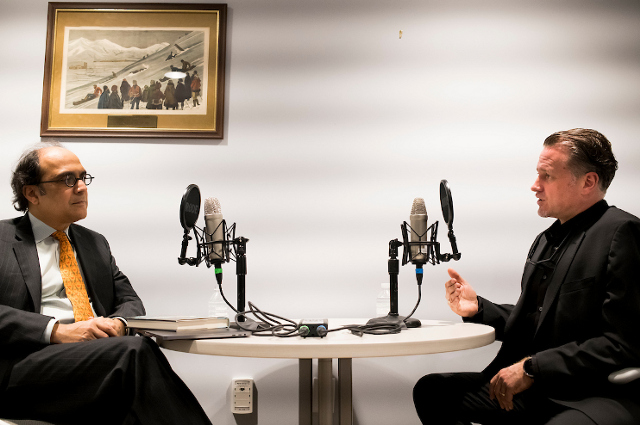Artificial Intelligence can be a force for good—or the opposite, says Olaf Groth in a Tufts podcast.
read more – copyright by now.tufts.edu
 “I think that’s the future of humanity: integrating with machines, letting them play to their strength, integrating with our strength, not competing head-to-head,” said Olaf Groth, here with Fletcher School’s Bhaskar Chakravorti. Photo: Alonso Nichols
“I think that’s the future of humanity: integrating with machines, letting them play to their strength, integrating with our strength, not competing head-to-head,” said Olaf Groth, here with Fletcher School’s Bhaskar Chakravorti. Photo: Alonso Nichols
Tell Me More is a Tufts University podcast featuring brief conversations with the thinkers, artists, makers, and shapers of our world. Listen and learn something new every episode. Subscribe on Apple Podcasts , Google Play Music , Spotify , Stitcher , and SoundCloud .
TRANSCRIPT
HOST: Welcome to Tell Me More , a podcast series featuring distinguished visitors to Tufts University who share their ideas, discuss their work, and shed light on important topics of the day.
Artificial intelligence has the potential to enrich our lives. But it can also drive people apart and cause tremendous harm. Olaf Groth, a professor at Hult International Business School and CEO of the Cambrian Group , explores how this technology is reshaping societies in his new book, Solomon’s Code: Humanity in a World of Thinking Machines . He co-authored the volume with Mark Nitzberg, who heads the UC Berkeley Center for Human-Compatible Artificial Intelligence. In this episode of Tell Me More , Groth—an alumnus of Tufts’ Fletcher School of Law and Diplomacy—talks with Bhaskar Chakravorti, dean of global business at The Fletcher School, about artificial intelligence—both its promise and its perils. Let’s listen in.
BHASKAR CHAKRAVORTI: Your book is called Solomon’s Code . Could you decode the title?
OLAF GROTH: Yeah, I’d be happy to, Bhaskar. So, King Solomon was a Biblical figure who was known for making very smart, very intelligent, and often wise decisions and getting to great wealth—but then also making some decisions that were tricky and problematic, and, in the process, losing his wealth and losing his country or his son’s country, as it were.
Thank you for reading this post, don't forget to subscribe to our AI NAVIGATOR!
And we’re saying in the book that we ought to be smart, we ought to be wise, and we ought to think ahead about the kinds of problems that we could be generating in this new data-driven economy. So, we do not want to end up like King Solomon, but rather get wise ahead of time and exercise some foresight so that we don’t go into the same pitfalls and make the same mistakes. That was the meaning of the title.
CHAKRAVORTI: What I really like about your book is you help us think simultaneously about the algorithmic future and the humanist future. And in many ways, the second part of your title, “Humanity in a World of Thinking Machines,” underscores that theme in your book. Could you say a little bit more about humanity and thinking machines? Is there a tension between the two? Can the two live and coexist simultaneously?[…]
read more – copyright by now.tufts.edu


Artificial Intelligence can be a force for good—or the opposite, says Olaf Groth in a Tufts podcast.
read more – copyright by now.tufts.edu
Tell Me More is a Tufts University podcast featuring brief conversations with the thinkers, artists, makers, and shapers of our world. Listen and learn something new every episode. Subscribe on Apple Podcasts , Google Play Music , Spotify , Stitcher , and SoundCloud .
TRANSCRIPT
HOST: Welcome to Tell Me More , a podcast series featuring distinguished visitors to Tufts University who share their ideas, discuss their work, and shed light on important topics of the day.
Artificial intelligence has the potential to enrich our lives. But it can also drive people apart and cause tremendous harm. Olaf Groth, a professor at Hult International Business School and CEO of the Cambrian Group , explores how this technology is reshaping societies in his new book, Solomon’s Code: Humanity in a World of Thinking Machines . He co-authored the volume with Mark Nitzberg, who heads the UC Berkeley Center for Human-Compatible Artificial Intelligence. In this episode of Tell Me More , Groth—an alumnus of Tufts’ Fletcher School of Law and Diplomacy—talks with Bhaskar Chakravorti, dean of global business at The Fletcher School, about artificial intelligence—both its promise and its perils. Let’s listen in.
BHASKAR CHAKRAVORTI: Your book is called Solomon’s Code . Could you decode the title?
OLAF GROTH: Yeah, I’d be happy to, Bhaskar. So, King Solomon was a Biblical figure who was known for making very smart, very intelligent, and often wise decisions and getting to great wealth—but then also making some decisions that were tricky and problematic, and, in the process, losing his wealth and losing his country or his son’s country, as it were.
Thank you for reading this post, don't forget to subscribe to our AI NAVIGATOR!
And we’re saying in the book that we ought to be smart, we ought to be wise, and we ought to think ahead about the kinds of problems that we could be generating in this new data-driven economy. So, we do not want to end up like King Solomon, but rather get wise ahead of time and exercise some foresight so that we don’t go into the same pitfalls and make the same mistakes. That was the meaning of the title.
CHAKRAVORTI: What I really like about your book is you help us think simultaneously about the algorithmic future and the humanist future. And in many ways, the second part of your title, “Humanity in a World of Thinking Machines,” underscores that theme in your book. Could you say a little bit more about humanity and thinking machines? Is there a tension between the two? Can the two live and coexist simultaneously?[…]
read more – copyright by now.tufts.edu
Share this: